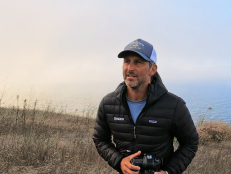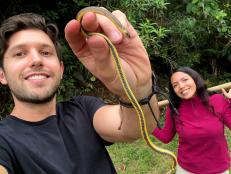Articles
Showing 91 - 105 of 2,630 results
Shark Week: The Podcast - Jeff Kurr on Filming a Life-Threatening Shark Encounter
Luke Tipple is joined by Emmy award-winning and longtime Shark Week filmmaker, Jeff Kurr to discuss his new documentary, Great White Open Ocean, and the life-threatening shark encounter captured in his film and seen in recent news.
Curiosity Daily Podcast: PPE Concrete, Steroid Use and ADHD, Butterfly Chastity
Today we discuss how recycling used personal protective equipment can make stronger concrete, a rise in ADHD symptoms among male weightlifters who take steroids, and the battle of the sexes among male and female butterflies!
Want to Name a Planet? Now’s Your Chance
Read on to learn about this rare opportunity to name a distant world observed by the James Webb Telescope.
What We Learn from the Lunar Surface
Sure, the Moon is cool to look at, and fun to think about it. And it literally affects us here on the Earth: without the Moon, we’d be missing half our tides, and likely our planet’s rotation wouldn’t be as stable as it is.
Curiosity Daily Podcast: DNA & Lookalikes, Extinct Lineage Found, Alzheimer’s Viruses
Today we learn about how doppelgangers can share similar DNA, a recent discovery of a lost lineage in Indonesia, and recent advancements in finding out what causes Alzheimer’s.
Curiosity Daily Podcast: Anti-Hangover Pill, Perks of Whale Poop, Found Dino Tracks
A Swedish company has created a new anti-hangover pill that reduces the short-term effects of drinking, whale poop is helping our ocean’s ecosystems, and a recent drought in Texas revealed the footprints from a dinosaur over 100 million years ago.
Six Planets are Retrograde, What Does that Mean for You?
Spoiler alert: It's an optical illusion.
Shark Week: The Podcast – Cristina Zenato on Why Sharks are the Safest Animal to Interact With on the Planet
Luke Tipple is joined by Cristina Zenato, “shark whisperer,” professional diver, shark expert, and founder of People of the Water. They discuss shark personalities, cognitive instincts, and their memory passed through DNA.
Watch NASA's Asteroid-Crashing DART Mission Make Impact
NASA sent a spacecraft on a mission to crash into an asteroid, so how did it go?Updated 9/26/22
Channel Islands: A Tale of Two Worlds
Channel Islands National Park is one of the least visited national parks in the United States, yet it is only about 20 miles from the coast of Los Angeles and the bustling surf and sand lifestyle of Southern California.
Curiosity Daily Podcast: Undead Spiders, Dandelion Drones, Dark Energy Made Light
Researchers are making small claws out of dead spiders, dandelion seeds are inspiring scientists to mimic their distribution with small sensors to be able to better track ecological information, and the Dark Energy Spectroscopic Instrument is helping us create a 3D map of the universe.
Three New Species of Snakes Discovered in Graveyards and Churches in Ecuador
A team of scientists led by Alejandro Arteaga, grantee of The Explorers Club Discovery Expeditions and researcher at Khamai Foundation, discovered three new cryptozoic (living underground) snakes dwelling under graveyards and churches in remote towns in the Andes region of Ecuador.
Jupiter Makes Its Closest Approach to Earth in Nearly 60 Years
The last time Jupiter appeared this large and bright in the sky was in October 1963.
A Shocking Change is Coming to Gold Rush
You won't believe what's coming. Discovery’s GOLD RUSH premieres Friday, Sept 30 at 8p ET/PT and streaming on discovery+.
Curiosity Daily Podcast: Gates of Hell, Cancer Clues, Hidden Jungle Cities
Today we discuss how a fiery pit in Turkmenistan has been burning for more than 50 years, new clues to the origins of cancer, and how ancient cities are hiding beneath the cover of forest canopies.






















